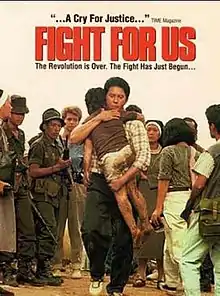Fight for Us
Fight for Us (titled Orapronobis in the Philippines) is a 1989 Philippine political thriller film directed by Lino Brocka and written by Jose F. Lacaba. It stars Phillip Salvador and Dina Bonnevie.
| Fight for Us | |
|---|---|
 | |
| Directed by | Lino Brocka |
| Written by | Jose F. Lacaba |
| Produced by |
|
| Starring | |
| Cinematography | Rody Lacap |
| Edited by |
|
| Music by |
|
Production companies |
|
| Distributed by | |
Release date |
|
Running time | 125 minutes |
| Country | Philippines |
| Language | Filipino |
Fight for Us premiered out of competition at the 1989 Cannes Film Festival.[1] For its French release, the original title of Orapronobis was changed due to its religious overtones.[2] In the Philippines, the film was heavily denounced by government officials for its subversive message that criticized the Aquino administration; it was never given a theatrical run in the country due to local censors.[3]
Plot
In 1985, in the obscure town of Santa Filomena, the Orapronobis, a cult under the leadership of Kumander Kontra (Roco), murders a foreign priest who gave the last rites to an alleged rebel, who was also executed by the same group. At the success of the 1986 EDSA revolution, political detainees, led by Jimmy Cordero (Salvador), celebrate the fall of the Marcos dictatorship. All political prisoners are released, including Jimmy, an ex-priest-turned-underground revolutionary. Not long, after, Jimmy marries a human rights activist, Trixie (Bonnevie). Jimmy becomes an advocate of human rights. Despite Trixie's protests, her brother, Roland (Lorenzo), and Jimmy go on a fact-finding mission to Santa Filomena to investigate the latest crime committed by the Orapronobis. Jimmy meets Esper (Alajar), his ex-girlfriend. He finds out that he has a son with her, Camilo (Herrera). They agree to keep Jimmy's true identity a secret from the boy. Conniving with the army, the Orapronobis step up their acts of terror. Jimmy's group helps evacuate the townspeople to the town church, then later to Manila. Back in Manila, Jimmy turns down a friend's invitation to rejoin the underground movement. Later, he and Roland are ambushed. Jimmy survives, but Roland does not. He recovers and shortly after that, Trixie gives birth to their child. Soldiers raid the refugee center with a masked man who identifies several of the barrio folk as rebels. The refugees and the human rights activists complain to the government. Esper and her son are abducted by the Orapronobis who accuse Esper of helping the rebels. She is raped and beaten up by Kumander Kontra in front of Camilo. Fighting back, she shoots at Kontra. In a hysterical rage, Kontra goes on a shooting rampage, killing Esper, Camilo and the captured barrio men. Later, the military bring the casualties to the town where Jimmy weeps over the bodies of Esper and his son. The film ends with Jimmy contacting his old colleague from the underground.[4]
Cast
- Phillip Salvador as Jimmy Cordero
- Dina Bonnevie as Trixie Cordero
- Gina Alajar as Esper
- Bembol Roco as Kumander Kontra
- Abbo dela Cruz as Django
- Pen Medina as Chief Sparrow
- Joel Lamangan as Col. Mateo
- Gerard Bernschein as Father Jeff
- Ernie Zarate as Bishop Romero
- Jess Ramos as Capt. Sumilang
- Obby Castañeda as Politician 1
- Pocholo Montes as Politician 2
- Ben Vibar as TV Newscaster 1
- Raquel Villavicencio as TV Newscaster 2
- Joe Taruc as TV Reporter 1
- Dodie Lacuna as TV Reporter 2
- Thea Cleofe Salvador as Government Representative
- Archie Adamos as Henchman
- Fred Capulong as Henchman
- Rene Hawkins as Henchman
- Esther Chavez as Mrs. Medina
- Estrella Kuenzler as Mrs. Cordero
- Ruben Rustia as Monsignor
- Apo Chua as Jun Lazaro
- Tess Dumpit as Malou Lazaro
- Raquel Tan as Secretary
- Suzette Rigor as Midwife
- William Lorenzo as Roland
- Mae Quesada as Volunteer
- Ramon Hodel as Volunteer
- Lito Tiongeon as Volunteer
- Mad Nicolas as Volunteer
- Nanding Josef as Volunteer
- Roger Moring as Orapronobis Death Squad
- Boy Roque as Orapronobis Death Squad
- Jun Nido as Orapronobis Death Squad
- Emil Estrada as Orapronobis Death Squad
- Ver De Guzman as Orapronobis Death Squad
- Ray Ventura as Refugee
- Connie Chua as Refugee
- RR Herrera as Camilo
- Beth Mondragon as Refugee
- Evelyn Vargas as Refugee
- Raul Alfonso as Refugee
- Ernie Cloma as Refugee
- Chie Concepcion as Refugee
- Bituin Rada as Refugee
- Malou de Guzman as Refugee
- Atong Redillas as Refugee
- Dante Balaois as Refugee
- Jovy Zarrate as Refugee
- Suyen Chua as Refugee
- Rody Vera as Terrorist
- Carol Villena as Terrorist
- Mina Nicolas as Terrorist
- Elson Montalbo as Terrorist
- Arthur Venegas as Terrorist
- Benjie Ledesma as Terrorist
- Menggie Cobarrubias as Human Rights Lawyer
- Ellen Ongkeko as Human Rights Lawyer
- Khryss Adalia as Human Rights Lawyer
- Rey Malte-Cruz as Human Rights Lawyer
- William Tan as Photojournalist
- Ramon Acasio as Photojournalist
- Jojo de Guzman as Photojournalist
- Arman Son as Photojournalist
- Peter Carillo as Photojournalist
- Vilma Deonio as Photojournalist
- Roger Escleto as Photojournalist
- Gil Martea as Photojournalist
- Mark Moncado as Photojournalist
- John Arcilla as Photojournalist
- Jenina Limlengco as Photojournalist
References
- "Festival de Cannes: Films out of Competition". Cannes Film Festival. Retrieved July 10, 2010.
- Libo-on, Eddie (July 31, 1989). "William Lao now happy". Manila Standard. Kagitingan Publications, Inc. p. 27. Retrieved July 13, 2023.
It was retitled 'FIght for Us' by the French producer because it sounds too religious for him.
- Red, Isah V. (December 5, 1997). "'Tongue-tied' in Tokyo". Manila Standard. Kamahalan Publishing Corp. p. 20. Retrieved July 13, 2023.
- "Orapronobis (1989): Plot". IMDb. Retrieved December 21, 2019.